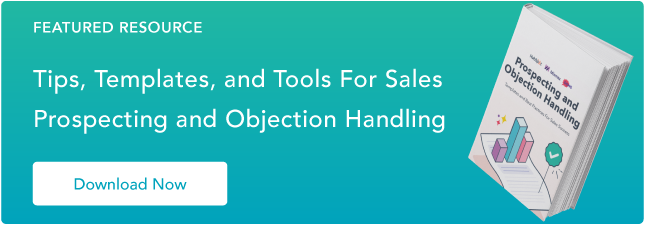The Best Way to Reach Out to a Prospect For the First Time
When In Doubt, Email First
The majority of experts recommended starting with an email. "An initial email usually makes more sense because it doesn't require [the prospect to] answer at the moment they receive it," writes Robert Graham, author of Cold Calling Early Customers.
Plus, as others pointed out, you can use an email as a reason to call.
"I always start by referring to this first email to show we're one step further in our relationship," explains Stan Frering, head of Client Relationship Management for Easytrip France.
Emailing has a third advantage over calling, according to EchoSign co-founder Jason Lemkin. It lets you educate your prospect on the product's value proposition, and clearly connect it with the prospect's situation.
"The prospect needs to understand the value proposition first," he explains. "It needs to be very strong, and very clear. No one will take a random call about a product they've never heard of it's not 100% crystal clear they have a huge, pre-defined need for it."
When to Ignore the Email-First Rule
However, there is one exception to the "email first" rule.
Lemkin says once your brand has been established, it's time to start calling your prospects.
"If your prospect has already heard of [your company], they'll know if they want to speak to you about the product and learn more about buying," Lemkin writes.
For example, say you're a salesperson for Dropbox. You call a prospect and say, "Hi John, I'm with Dropbox, and I noticed your CEO tweeted that your company is almost out of free virtual storage. I'd love to discuss how we could get you some more so you can keep all your files in one place."
John already knows Dropbox and understands why it's a useful product -- so he's got a good reason to stay on the phone.
However, if you were selling a brand-new cloud storage solution, Lemkin argued that it would be better to send John an email first so he has more time to consider your value prop.
Not sure how much clout your company name carries? To quickly gauge brand awareness, go to Google Trends and compare how many people are searching for your company versus your top competitors. If your company gets the most searches, that means it probably has the highest name recognition in your space.
A Better Method Than Phone Or Email?
But to one expert, the question of "phone vs. email" is innately flawed.
SVP at LivePerson Sean Burke says that, in fact, your default shouldn't be calling or emailing. He recommends using your network to get an introduction -- great advice, considering that having a referral makes a buyer five times more likely to engage.
"You'd be surprised how often this crucial first step is ignored," Burke writes.
Once your mutual connection has agreed to introduce you, ask him or her which communication method the prospect prefers. Most people have an individual preference for calling or emailing.
However, if you don't have a shared connection, Burke suggests looking at the prospect's social media presence. If she is "social" -- meaning she's got 500-plus LinkedIn connections and an active Twitter or Instagram account -- use those channels to interact with her and start adding value. If she's "traditional" -- meaning she doesn't meet those criteria -- Burke gives you the go-ahead to call or email.
Whatever You Do, Don't Cold Call or Spam
While opinions differed on the relative merits of calls vs. email vs. social media, the experts were unanimous on one point: You should never reach out to a prospect via any channel without doing research first.
"Ultimately, you are in a much better position -- either calling or emailing -- if you have background information on the person you are contacting," notes Jeremy Boudinet, head of marketing for Ambition. "That way, you can tailor your message off the bat, since you have an idea of how you can add value to that person or company."
Sales Email or Sales Call? Experiment and Find Out
Although these guidelines should definitely guide your prospecting strategy, don't forget they're just that: guidelines. "Why not take a test-and-learn approach to this problem?" writes Nick Dellis, Weebly's VP of Business Development. "What works for you may not work for others."
Dellis suggests emailing first, then calling with 10 to 20 prospects, doing the reverse with another 10 to 20 prospects, and comparing the results.
"Taking this approach of testing ideas and optimizing is the only way to find out for yourself," he says. "And it'll help you be a better salesperson in the longer term."
First Contact Email
If you choose to start the conversation with an email, be sure you include a rapport-building element and communicate your value proposition.
Not sure what a first contact email should look like? Here's an email template you can use to start your outreach.
Hi [Prospect Name],
Because I work so much with [targeted industry], I constantly follow industry news. Recently, I noticed you've [insert company action].
Usually when that happens, [insert business issue] becomes a priority. That's why I thought you might be interested in finding out how we helped [similar company] quickly get started in a new direction with a customized solution.
Check out our [case study/research] here. If you'd like to learn how [your company] can help [prospect's company], let's set up a quick call. Schedule 15 minutes here on my calendar.
Kind regards,
[Your Name]
P.S. If you're not the right person to speak with, who do you recommend I talk to?

And to learn more about sales prospecting, check out these email templates to get and keep buyers' attention next.
Sales Prospecting



.webp)






![How to Find Almost Anyone’s Email Address, Without Being Creepy [+Expert Tips]](https://53.fs1.hubspotusercontent-na1.net/hubfs/53/132_Find%20Email%20Address.jpg)

